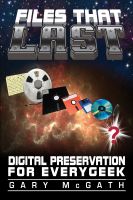Technologies develop to a point where they’re good enough for widespread use. Once a lot of people have adopted them, it’s hard to move on from there to a still better one, since people have invested so much in a technology that works for them. We see this with cell phone communication, which is pretty good but would undoubtedly be much better if it could be invented all over today. We see it with the DVD format, which Blu-Ray hasn’t managed to push aside in spite of huge marketing efforts. And we see it in file formats.
Most of today’s highly popular formats have been around since the nineties. For images, we still have TIFF, JPEG, PNG, and even the primitive GIF format, which goes back to the eighties. In audio, MP3 still dominates, even though there are now much better alternatives.
This is a good thing in many ways. If new, improved formats displaced old ones every five years, we’d be constantly investing in new software, and anyone who didn’t upgrade would be unable to read a lot of new files. Digital preservation would be a big headache, as archivists would need to migrate files repeatedly to avoid obsolescence.
It does mean, though, that we’re working with formats that have deficiencies which often have grown in importance. JPEG compression isn’t nearly as good as what modern techniques can manage. MP3 is encumbered with patents and offers sound quality that’s inferior to other lossy audio formats. HTML has improved through major revisions, but it’s still a mess to validate. For that matter, we have formats like “English,” which lacks any spec and is a pile of kludges that have accumulated over centuries. Try finding support for supposed improvements such as Esperanto anywhere.
It’s a situation we just have to live with. The good enough hangs on, and the better has a hard time getting acceptance. Considering how unstable the world of data would be if this weren’t the case, it’s a good thing on the whole.
 There’s the blatantly obvious. Then there’s the blatantly cynical, who-cares-if-you-see-right-through me obvious. I’m not talking about Donald Trump but Fraunhofer. The patents which gave them revenue have barely expired on the format, and
There’s the blatantly obvious. Then there’s the blatantly cynical, who-cares-if-you-see-right-through me obvious. I’m not talking about Donald Trump but Fraunhofer. The patents which gave them revenue have barely expired on the format, and 
 iTunes is horrible and keeps getting worse. The current version has come down with dyslexia; it can’t even play my files in order. On top of that, it supports a poor range of file formats, knowing nothing about popular open formats like FLAC and Ogg Vorbis. QuickTime Player has a saner user interface but the same format limitations. If you want to play music in those formats, you need to look for other software. I’ve just grabbed
iTunes is horrible and keeps getting worse. The current version has come down with dyslexia; it can’t even play my files in order. On top of that, it supports a poor range of file formats, knowing nothing about popular open formats like FLAC and Ogg Vorbis. QuickTime Player has a saner user interface but the same format limitations. If you want to play music in those formats, you need to look for other software. I’ve just grabbed 
Remembering the DAT war
Waking up briefly to mention an interesting article…
In 1986, the RIAA was outraged that Sony’s Digital Audio Tape (DAT) would let ordinary consumers record high-quality sound. The format was expensive and never caught on in the mass market, but it led to other digital audio formats. In retrospect, we’re lucky to have reached a state where we can record sound without mandatory DRM. (If you don’t believe me, recall that strong encryption was once outlawed.) The article mentions that “Computer manufacturers successfully lobbied to exempt CD-ROM drives from copyright protection technology.” Our technology would be much less advanced today if we had to jump through copy-protection hoops every time we used a computer.
Comments Off on Remembering the DAT war
Posted in commentary
Tagged audio, DAT, DRM